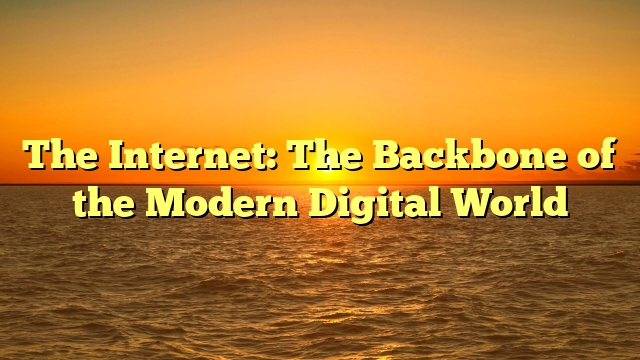
By [Your Name]
The internet stands as one of the most transformative inventions in human history, revolutionizing the way we communicate, work, learn, and entertain ourselves. From its humble beginnings as a network for academic and military use, the internet has evolved into a global phenomenon that connects billions of people and devices. This article delves into the history, technology, impact, challenges, and future prospects of the internet, highlighting its pivotal slot pulsa role in shaping the modern world.
A Brief History of the Internet
The origins of the internet can be traced back to the late 1960s with the development of ARPANET (Advanced Research Projects Agency Network) by the United States Department of Defense. ARPANET was designed to facilitate communication between research institutions and was the first network to implement the TCP/IP (Transmission Control Protocol/Internet Protocol) protocols, which remain foundational to the internet today.
Throughout the 1970s and 1980s, the network expanded beyond military and academic circles, incorporating various institutions and laying the groundwork for a more interconnected system. The introduction of the World Wide Web by Tim Berners-Lee in 1989 revolutionized the internet by providing a user-friendly interface for accessing and sharing information. The 1990s saw the commercialization of the internet, with the rise of internet service providers (ISPs) and the proliferation of personal computers, making the internet accessible to the general public.
How the Internet Works: Key Technologies
Understanding the internet’s functionality involves several key components and technologies:
- Protocols: The internet operates on a set of protocols, primarily TCP/IP, which govern how data is transmitted and received across networks. These protocols ensure that information sent from one device can be accurately received by another, regardless of their physical location.
- Servers and Clients: The internet is a vast network of servers (powerful computers that store and manage data) and clients (devices like computers, smartphones, and tablets) that request and display information. When a user accesses a website, their device (client) sends a request to the server hosting that site, which then responds with the necessary data.
- Domain Name System (DNS): DNS translates human-readable domain names (like www.example.com) into IP addresses that computers use to identify each other on the network. This system makes navigating the internet more intuitive for users.
- Fiber Optics and Wireless Technologies: Data transmission over the internet relies on fiber optic cables, which use light to carry information at high speeds, and wireless technologies like Wi-Fi and cellular networks, which enable mobile internet access.
The Evolution of Internet Access
Internet access has undergone significant transformation over the decades:
- Dial-Up Connections: In the early days, internet access was primarily through dial-up connections using telephone lines, which were slow and limited in bandwidth.
- Broadband: The advent of broadband technologies, including Digital Subscriber Line (DSL), cable, and fiber optics, provided much faster and more reliable internet connections, facilitating the growth of data-intensive applications like video streaming and online gaming.
- Mobile Internet: The rise of smartphones and advancements in cellular networks (3G, 4G, and now 5G) have made the internet ubiquitously accessible, allowing users to connect from virtually anywhere.
- Satellite and Emerging Technologies: Satellite internet and emerging technologies like Low Earth Orbit (LEO) satellites aim to bridge the digital divide by providing high-speed internet access to remote and underserved areas.
The Impact of the Internet on Society
The internet’s influence permeates nearly every aspect of modern life:
Communication
The internet has revolutionized communication, making it instantaneous and global. Email, instant messaging, video conferencing, and social media platforms enable people to connect, collaborate, and share information across vast distances with ease. This has fostered greater interconnectedness and enabled new forms of social interaction and community building.
Education
Online education platforms, digital libraries, and open educational resources have transformed learning, making education more accessible and flexible. Students can now pursue degrees, acquire new skills, and access a wealth of information from anywhere in the world, democratizing knowledge and empowering lifelong learning.
Business and Economy
The internet has fundamentally altered the business landscape, enabling e-commerce, digital marketing, remote work, and the rise of the gig economy. Companies can reach global markets, streamline operations through cloud computing, and leverage data analytics to make informed decisions. The digital economy has become a significant driver of growth and innovation.
Entertainment
Streaming services, online gaming, digital media, and social platforms have reshaped the entertainment industry. Consumers can access a vast array of content on-demand, participate in interactive experiences, and engage with creators and other fans in real-time, enhancing the personalization and interactivity of entertainment.
Social Interaction
Social media platforms like Facebook, Twitter, Instagram, and TikTok have transformed how people interact, share experiences, and express themselves. These platforms facilitate the creation of online communities, influence public opinion, and provide spaces for activism and social movements, albeit with both positive and negative implications.
The Role of the Internet in Innovation and Technology
The internet serves as a catalyst for technological innovation, fostering advancements across various fields:
- Cloud Computing: The internet enables cloud services, allowing businesses and individuals to store, process, and access data remotely. This has led to scalable and flexible computing solutions, supporting everything from startups to large enterprises.
- Internet of Things (IoT): The integration of internet connectivity into everyday objects has given rise to IoT, where devices like smart home appliances, wearables, and industrial sensors communicate and interact, enhancing automation and data collection.
- Artificial Intelligence (AI) and Machine Learning: The internet provides the vast datasets necessary for training AI and machine learning models, driving advancements in areas such as natural language processing, computer vision, and autonomous systems.
- Big Data and Analytics: The ability to collect and analyze massive amounts of data over the internet has revolutionized industries like healthcare, finance, marketing, and logistics, enabling data-driven decision-making and predictive analytics.
Challenges and Issues in the Internet Age
Despite its myriad benefits, the internet presents several challenges and issues:
Cybersecurity
As the internet becomes increasingly integral to personal and professional life, cybersecurity threats have escalated. Cyberattacks, including hacking, phishing, ransomware, and data breaches, pose significant risks to individuals, businesses, and governments. Ensuring robust security measures and raising awareness about safe online practices are critical to mitigating these threats.
Privacy Concerns
The pervasive collection and analysis of personal data by corporations and governments raise serious privacy concerns. Issues such as data surveillance, unauthorized data sharing, and lack of transparency in data handling practices have sparked debates about the balance between convenience and privacy rights.
Digital Divide
Despite the internet’s widespread availability, significant disparities exist in access and quality of internet service across different regions and demographics. The digital divide exacerbates social and economic inequalities, limiting opportunities for education, employment, and participation in the digital economy for underserved populations.
Misinformation and Content Regulation
The rapid spread of information on the internet has also facilitated the dissemination of misinformation, fake news, and harmful content. Regulating online content without infringing on free speech remains a complex challenge, with implications for public trust, democratic processes, and social cohesion.
Addiction and Mental Health
Excessive internet use, particularly on social media and gaming platforms, has been linked to issues such as internet addiction, anxiety, depression, and reduced attention spans. Addressing the mental health impacts of internet use involves promoting digital well-being and responsible online behaviors.
The Future of the Internet
The internet continues to evolve, with emerging trends and technologies poised to shape its future:
5G and Beyond
The rollout of 5G networks promises faster speeds, lower latency, and greater connectivity, enabling new applications in areas like augmented reality (AR), virtual reality (VR), autonomous vehicles, and smart cities. Future advancements in wireless technology will further enhance the internet’s capabilities and reach.
Decentralization and Blockchain
Decentralized technologies, such as blockchain, aim to distribute control away from centralized entities, enhancing security, transparency, and user autonomy. Applications include decentralized finance (DeFi), digital identity management, and secure data sharing.
Edge Computing
Edge computing brings data processing closer to the source of data generation, reducing latency and bandwidth usage. This is crucial for applications requiring real-time processing, such as IoT devices, autonomous systems, and interactive services.
Quantum Computing
Quantum computing, still in its nascent stages, holds the potential to revolutionize data processing and encryption, solving complex problems beyond the capabilities of classical computers. Its integration with the internet could lead to unprecedented advancements in various scientific and technological fields.
Enhanced Internet Governance
As the internet becomes more integral to global infrastructure, the need for effective governance and international cooperation increases. Issues such as net neutrality, digital rights, and cross-border data flows require coordinated efforts to ensure a fair, secure, and open internet for all.
Conclusion
The internet has indelibly transformed every facet of modern life, driving innovation, connectivity, and economic growth. Its ability to adapt and evolve in response to technological advancements and societal needs underscores its enduring significance. However, as the internet continues to expand its influence, addressing the accompanying challenges—such as cybersecurity, privacy, and the digital divide—remains imperative. Looking ahead, the internet’s future promises even greater integration with emerging technologies, fostering a more connected, efficient, and dynamic global society. As we navigate this digital era, the internet will undoubtedly remain the backbone of our interconnected world, shaping the trajectory of human progress for generations to come.





